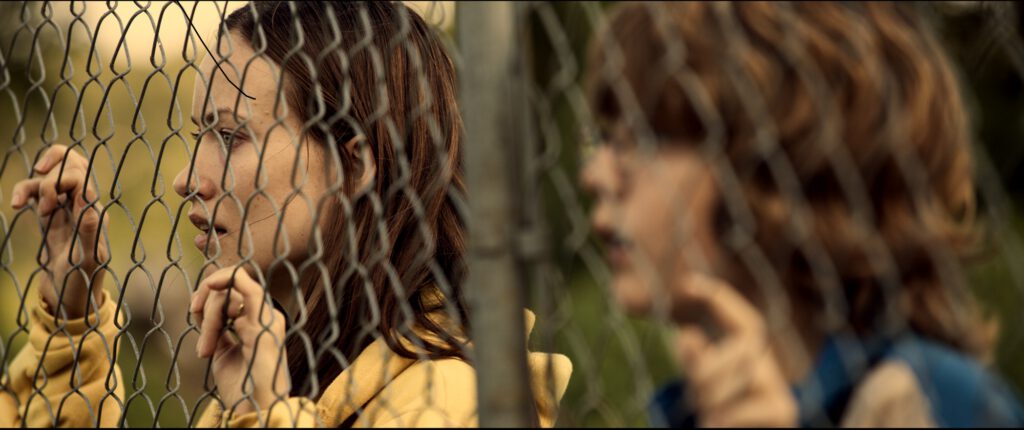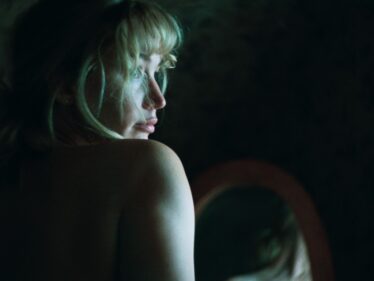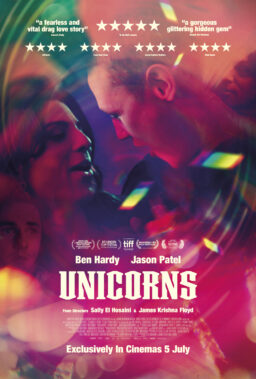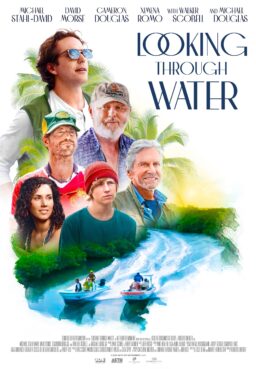Reed Morano is a busy cinematographer, with credits on “Frozen River,” “The Skeleton Twins,” “Little Birds” and “Kill Your Darlings,” to name just a few. “Meadowland,” which opens October 16, starring Luke Wilson and Olivia Wilde, is her first feature as a director. It is filled with great performances, not only from the two leads, but from the supporting cast that includes Juno Temple, Elisabeth Moss, John Leguizamo, Giovanni Ribisi, Kevin Corrigan.
Morano’s film tells the story of a couple whose son goes missing from a New Jersey gas station. The marriage fractures in the aftermath, and the two find themselves veering off into separate circles of private pain. They can no longer connect. It is the silent isolation of profound grief that “Meadowland” really understands, a welcome corrective to the “catharsis and then hug it out” mode. Sarah, played by Olivia Wilde, is especially disoriented, and her journey, jagged and unpredictable, illogical to outsiders and yet totally logical to her, makes up the heart of the film. Wilde is extraordinary, but Wilson is just as good, as a “regular guy” (one of the rarest qualities in actors, and something he brought to bear naturally in his role in “The Skeleton Twins”). Morano’s style as a filmmaker (she also shot the film) is both naturalistic and surrealistic, bringing us deeper and deeper into Sarah’s obsessive psychosis and grief.
I spoke with Morano recently about “Meadowland,” casting Olivia Wilde, the fine line women have to walk in the industry, and more.
You’re a cinematographer by trade, and this is your first film as a director. How did this project come about, and how did you decide, “I want to direct something, and this is the one”?
I went to film school for directing and I ended up focusing on cinematography. But I always thought maybe one day I’ll direct something. I think I subconsciously knew you needed life experience to direct and the best films are directed by people who have really lived, with exceptions like Orson Welles, who just burst out of the gate. There are prodigies like that but for me, personally, I thought I needed life experience. I’ve DP’d so many films for first-time directors and I know the trauma, the heartbreak, the vulnerability, how much you have to believe in the story. I wanted to make sure I knew I could do something good with it, otherwise there would be no point. I was DP-ing a feature in Austria and the producer, Matt Tauber, said to me, “You should think about directing,” and he sent me a couple of scripts, but nothing hooked me until he sent me a script by Chris Rossi called “Meadowland.”
And what was it about that script?
The script was very different when I first got it, it was a little more procedural, but the idea of a mother going off the rails was there. There’s one scene where she goes into the car and finds the cookie. When I read that, I started crying. Reading scripts as a DP, if I get that emotional reaction from a script, I think, “Oh, this could possibly be a really good movie if done right.” I had to gain Chris trust to see if he liked me, and we started working together. Chris is such a great collaborator.

You also decided to shoot it yourself.
That wasn’t really the original intention. Right off the bat, I reached out to all of these great DPs I admire, and I’m friends with them, they know my work as a DP, but I thought, “Why would they come and work for me on a tiny budget, for no money, when they haven’t seen if I can direct yet?” Also, the story is super dark so it’s not a guaranteed commercial success. People were kind of like, “Thanks for asking!” It was coming to a point where I was going to have to work with a DP where maybe I would know what I want better than they did. I thought it would be more distracting to have someone else doing it and not doing it right, or doing it too slow, and I’d rather just have all the responsibility myself. I know DP-ing very well but I don’t know directing, so it was a big risk. It was sad because I missed out on that “two heads are better than one” aspect, which worked so well with all the other department heads—editor, production designer, costume designer—they contributed so much to the movie. But if I had to go back and do it again, I would still shoot it myself.
In the planning process, did you see it in a visual way, with flashes of how you would do it?
There was never a moment where I decided, “This is how the film should be shot.” I don’t think I decided it was going to be all hand-held until after working on it for a year. I wanted it to feel as real as possible, in a vérité kind of way. Fancy camera set-ups and elegant camera set-ups can separate you from emotion, so I had that in my mind.
Let’s talk about the cast. How did you get these people?
Olivia came on first. She wasn’t the first person I imagined for the role, and I’ve said that before, but she opened my eyes to her. Her agent brought her the script and said, “You’re going to love this, but it’s very competitive,” so she was on it. She pursued that role. We ended up having lunch together. The things I was holding against her are things that are not her fault. It wasn’t about her acting ability. I saw Sarah as an everywoman, and I thought, “How am I going to make someone as singularly beautiful as Olivia Wilde disappear into an everywoman?” And then also the fact that she wasn’t a mom. Those were my two reservations. When I met with her and heard her reaction to the script, I felt, “Wow, this woman is so smart, so hungry for it, as passionate as I am. I feel like she’ll stop at nothing to get this role,” and in our meeting she actually offered to audition for me, which is unheard of for a star as big as her. But I think we both saw something in each other in that reading of the script. I gave her an adjustment that she felt was interesting and she responded to that adjustment in a really unexpected way. I think we both were really inspiring to each other. It became a no-brainer. And my issues with her being too beautiful or not being a mom, were instantly assuaged. The mom thing went out the window because actors are actors for a reason. They can imagine anything. It’s impossible to ugly Olivia Wilde down, for the record, but I don’t think her beauty distracts. She is mesmerizing, and it sucks you into the character.
Luke and I had worked on “Skeleton Twins” together. I was a huge fan of his since “Bottle Rocket,” and I thought, “This is such an untapped talent.” What was so exciting about casting Olivia was the potential of what she could bring to a role, because she had never been given such an opportunity and I felt she could do it. And I felt the same thing with Luke! He’s been around, but maybe he could do something really different than anything else he had done. The other actors were receptive to coming onto the project because they knew me. Juno Temple and I had done a movie called “Little Birds” together and I shot that when I was eight months pregnant, and every day she would run up and put her hands on my belly. Even for a five-minute scene in “Meadowland,” she was totally down for it. And [Elisabeth] Moss I’m friends with, and when I told her about the story she was excited, and I thought she would be so interesting in that role.
I loved her pink sweat pants.
Oh yeah, I thought she had to have pink New Jersey sweat pants.

When you’re on the set shooting something, and you want something different from what you’re seeing, how do you like to work with actors?
The approach was: These actors were doing something outside of their wheelhouse, there was an unknown there. How dark could Luke go? How dark could Olivia go? My first step was to see what they would do first, before I even said anything. I got a piece of advice from a good friend of mine who is a great director. He said, “Less is more.” This also comes from being a camera operator and a DP—I want the director to give me a chance to show what I can do before they try to micro-manage what I’m doing. Actors must feel the same way. Let them get into the rhythm with each other, and the camera, and all the business they have to do. Let’s give them a couple shots at it first. If it’s not going where it should be going, then I can step in and suggest some ideas. Actors feel empowered and safe when they’re being trusted. Sometimes when you give an actor a little bit of freedom and they feel trusted, they’ll be more vulnerable, more honest, and take more risks. You get better stuff that way.
One of the things I found so moving was how the couple fractured in the aftermath of that horrible event. There was a silence in their interactions, a hollowness. It was unpredictable. I didn’t know what this woman would do next.
That’s one of the things that attracted me to Chris’ script. It was a challenge to have these characters do these really unlikeable things but make the audience totally forgive them, or at least empathize with them. One of the other things that is really interesting is to create a visceral experience inside a person’s psyche. Can you put the audience on that journey, not just in an observational way, but through cinematic devices that make them feel like they are in a hallucinatory situation where things are mentally jarring?
You made some very specific visual choices, like following her through Times Square, or showing just fragments of her face. Those choices were an expression of what she felt like, her disorientation, as opposed to a linear presentation of what she was going through.
When you go through a traumatic situation, you go into a weird “Twilight Zone” version of your life. You think, “This isn’t real life, but I have to get used to this new life. This is the way things are now.” My dad passed away when I was 18, and last year I had cancer, which is in remission now—but I remember having tunnel vision going through those experiences. Everything is a blur around you. You remember things selectively. Hearing is selective. That was one of the things that I felt would be really interesting to explore. The other thing is that I feel like grief is not always presented accurately in film. Like you said, it’s often presentational and representational, and the way to convey it is having someone being hysterical or whatever. I thought, though, wouldn’t it be better if things didn’t veer off into melodrama? My original goal was to not have anyone in the film cry at all, until maybe the very end, but I was also in touch with the fact that actors are going to do things, and I wasn’t going to control it and say, “Don’t ever cry in this movie!” But I had it in my mind—what’s more heart-wrenching is when I have to watch a character invested in trying to hold back their sadness.

Can you talk a little bit about her throwing out the Lithium? I liked that her diagnosis remained un-named.
Chris had her on Lithium in the script and we talked a lot about it. Is she on it just because of what happened to her child? Did she go on it after he went missing? For Chris, it was that she was in a mode, and now things were about to change. There was going to be a new stage in her dealing with this, because she’s decided, “I want to start to feel what’s happening here.” I do think there is something bipolar about her rhythms.
For me, it was the scene with Giovanni Ribisi and Olivia Wilde up on the roof doing drugs. The sunset light, her eyes flashing translucent, and she just seemed really over the edge. It was very scary but you couldn’t really put your finger on why.
I had this amazing sound designer, Tony Volante, and one of the things I had told him was that we were going to do some crazy stuff with sound. I come from the visual side, but I so gravitated towards sound and and wanted to create the feeling in that rooftop scene that we were on this drug trip with them, but not do it visually. In most movies, it’s done visually or through performance, and I wanted to do it through the sound. In that scene, it sounds like the air is being sucked up into a vacuum, and everything they were saying was repeating, and we made their whispers double up and echo. It’s scary because of Olivia’s performance but that added element enhances it.
I thought she might go jump off the roof. That was something she seemed capable of at that point.
I love that you thought that because every time she walked up to the edge of the roof I thought, “Oh God, please don’t jump.”
What’s next for you?
I spent the last six months as a DP on “Vinyl,” an HBO series, and actually Olivia is one of the stars on it. It was so weird the first day on the set: she wasn’t Sarah anymore! Olivia and I are seeking out another project to do together. We’ve found a good thing and we don’t want to let it go. “Meadowland” is just scratching the surface of what she can do. I have another project lined up called “Lioness,” and it came to me already cast. I’m excited to work with Ellen Page, and it’s based on a true story about a female Marine who went to Afghanistan and Iraq as part of the first female engagement team. “Lioness” has everything I like: high moments, dark moments, poignant moments, inspirational moments, bad-ass moments. And it has explosions, too. If I want to check all the boxes …
In terms of directing and salary, could you talk about any difficulties you may have experienced in the industry as a woman?
I’ve been pretty lucky, although I do remember there were a couple of jobs I didn’t get because I was pregnant. Right after I did “Frozen River,” I met with a bunch of agencies, and at the time—not unfortunately, but some would say unfortunately—I was four or five months pregnant with my son. These agents did not know that the person who was going to be walking through the door into their fancy office was a five-month pregnant woman. And they looked at me and said, “Where do you see yourself in ten years?” I said, “Well, I see myself shooting bigger and bigger features.” But I knew they were thinking, “She’s just going to be a stay-at-home mom with three kids.” And of course I never heard from them. Luckily, I found an agent and she was this no-bullshit bad-ass woman who didn’t even care that I was pregnant. She said, “I’m pretty sure if I put you into a room, nine times out of ten you’re going to get the job. Do you want to work with me?” Instead of testing me and asking where I wanted to be in ten years, she had total confidence in me. People have to support women and women have to support other women. I have been lucky in getting a lot of the projects I’ve wanted, maybe because I’m really, really driven. But there is a stigma that women can’t direct big studio films. Not that I want to do that, but it is a topic that comes up a lot. One of the things we talk about is: Isn’t it weird that this male director who has only directed a $2 million dollar Sundance movie is now suddenly directing a hundred-million-dollar Marvel movie, for his second film? And you definitely don’t see happen that with women. There’s a discrepancy there.
Women have to compensate more in the personality department in order to get the things that men get. And they don’t have as much leeway for being divas or jerks. You have to be a perfect model of a person: easy to work with, respectful to everyone, yet totally confident and in control, but in a way that doesn’t come off like you’re a bitch. It’s a really fine line to walk.
I do feel like it’s changing, though. Times are changing. Everyone’s watching.












